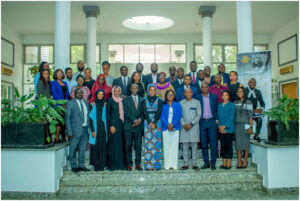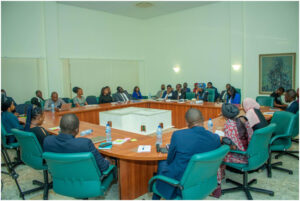Hamu Legal hosts Leading Lawyers and Election Experts at a Round Table Session to Unpack the Electoral Act 2022


February 20, 2023 – Five days before the 2023 presidential election, Hamu Legal and YIAGA Africa organised a round table at the Shehu Musa Yar’adua Center in Abuja, Nigeria, with the theme “Where the Rubber Hits the Road: Steering through the Electoral Act 2022.”
The Electoral Act, 2022 heralds a new era in Nigeria’s democratic history, especially in the light of significant modifications made to the laws governing elections. Legal experts, technology analysts, election experts and journalists discussed the legal concerns surrounding elections integrity and governance framework in the invite-only roundtable.
Topics such as elections oversight and regulation, technological advancements in the Electoral Act, the interaction of the courts and elections, and related issues were analysed by legal experts in the field of elections and technology.
The speakers and moderators included Saadatu Hamu Aliyu, Rilwan Idris, Muhammad Yunusa, Samson Eigege, M. I. Dikko S.A.N, Dr. Kayode Ajulo, and Abdulaziz Sani SAN, who inspired and informed the audience about the innovations in the Act as well as the Act’s “grey areas” relating to the use of technological tools for administering elections and judicial adjudication as our understanding of technology and elections continues to develop.
The first session, titled “Elections in a Networked Era,” focused on the employment of digital tools in the 2023 election process that were introduced by the Electoral Act of 2022. The main tools to be utilised for the 2023 election are the INEC Result Viewing Portal (IReV) and the Bimodal Voter Accreditation System (BVAS). Amara Nwankpa, Director, Public Policy Initiatives, Yaradua Foundation stated that “there must be strict monitoring of the technologies being used for elections so that the purpose for which they were introduced is not defeated.”
The management of the elections is expected to become more transparent and efficient due to the use of technology. There was a lot of optimism about the advancement and opportunities for progress despite the looming challenges and weaknesses of the current electoral system.
The second session gave a general overview of how to navigate legal obstacles in the election process and the role of litigants, lawyers and judges in the adjudication process. With at least 770 pre-election proceedings pending before the Supreme Court of Nigeria, Samson Eigege talked about the ambiguities surrounding the timing and crystallisation of action with regard to pre-election disputes.
In his analysis of the recently concluded Machina v. Ahmed Lawan case, Dr. Kayode Ajulo noted that, when it comes to elections, “Our Court is not a Court of equity, but a Court of Law. Technicality is part of our Law and technicality comes to play mostly during an election petition”.
A summary of the election results’ journey from the polling unit to the collation center was provided in the third session, which was led by Abdulaziz Sani SAN of the Independent National Electoral Commission. A special focus was placed on the method of result transmission required by the Act as well as guidelines for electoral officers using the BVAS.
Saadatu Hamu Aliyu, the Managing Partner of Hamu Legal who hosted the Roundtable, commented: “Part of our core mission at Hamu Legal is to work at the intersection of technology law and policy, and it is our belief business and public interest world alike demand advocates who can address new legal challenges as they arise alongside rapid advances and technology. We expect this roundtable to be a catalyst for navigating the opportunities and challenges this Act presents in navigating our electoral processes jurisprudence.”
In collaboration with YIAGA, Hamu Legal will consequently publish a report on the outcomes, lessons and recommendations from the Round Table.
About Hamu Legal:
Hamu Legal is a leading Law Firm, operating on the intersection of law, technology business and policy in Nigeria.

